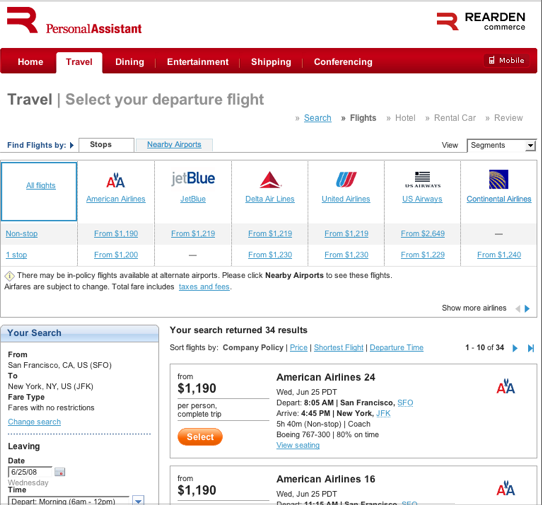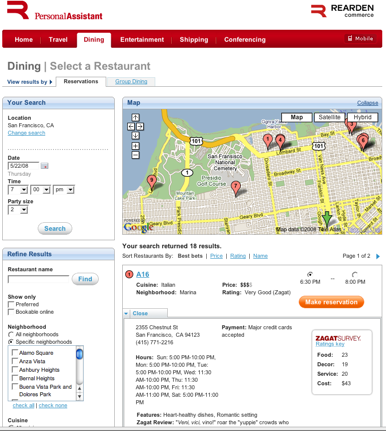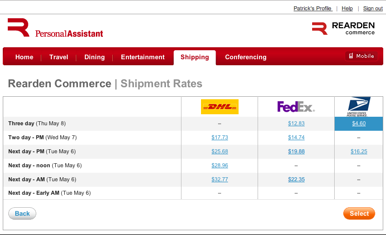Patrick Grady has spent the past eight years of his life building the ultimate personal Web assistant in relative obscurity. But now his company, Rearden Commerce, is quietly emerging as major force among enterprise startups. He has confirmed that, as previously reported, Rearden has closed a $100 million round of funding from investors that include American Express, JPMorgan Chase, Oak Investment Partners, and Foundation Capital. American Express already invested in a previous round and is Rearden’s single largest customer—its corporate travel business resells Rearden’s all-in-one Web travel booking service to 1,300 corporate customers.
All in all, Rearden now offers its services to more than 1,700 corporations, up from 92 two years ago before signing AmEx as a partner. Pharmaceutical giant GlaxoSmithKline alone has about 60,000 employees on Rearden. Collectively, those corporate customers have about one million employees using Rearden to book flights, cars, hotels, dinner reservations, baseball games, theater tickets, conference calls, and even ground shipping. (See our review from last year).
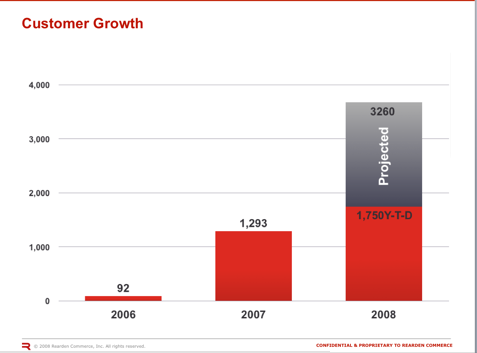
To put that into perspective, that is about the same number of employees who use Salesforce.com. Of that million, about 15 percent are active in a given month, and all together they are well on their way towards spending $1 billion on travel-related services this year through Rearden. That is a tenfold increase in transactions over last year, and every step of the way Rearden takes 6 percent to 25 percent of every non-travel dollar spent. Updated: The fees on travel transactions like flight and hotel are low-margin commodities. It’s the extra stuff like dining, event tickets, conferencing, car services, airport parking, meetings and shipping where there are more margin and more savings to be had that Rearden makes its 6 to 25 percent cut. It also has other revenue streams, including third-party apps and advertising (see below).
The company has 316 employees, going to 400 this year. Most of those are engineers, since AmEx has hundreds of sales people pushing the service. And AmEx will soon expand the offering to its UK customers as well. So far, Grady has built his business by signing up big enterprise customers. But now he is ready to take his first step towards the consumer market.
That’s where Chase comes in. In addition to being an investor, Chase has also signed on as Rearden’s second giant customer. It plans on offering Rearden’s personal Web concierge service to its 90 million bank card holders. Anyone with a Chase bank account, whether business or personal, will be able to use the service. Eventually, Grady plans on opening up the service to all consumers, but AmEx and Chase are making it worth his while to give them exclusivity for at least another year.
In addition to the transaction fees, he also charges application developers 25 percent to 50 percent of their subscription fees to gain access to all the corporate customers on Rearden. And he also sees an opportunity on the upside for highly targeted advertising in the form of real-time offers from local restaurants and other businesses. He explains:
I am coming to New York. What does my Rearden Commerce personal assistant know about me? It knows I am a CEO of a Silicon Valley company, I will be staying downtown, I will be in midtown during the day, and it knows I like sushi.
Rearden has done the hard job of integrating different travel services together all through a single browser interface. Updated: The hard part is not only the technology—which is all about integrating an unruly mess of APIs and Web services—rather it is signing commercially binding service level agreements with 135,000 merchants across the world. . What’s more the system ties in your personal preferences with your company’s travel rules, restrictions, and negotiated rates to give you a customized view of what’s available to you. Think of it as Kayak, TripIt, StubHub, Zagats, OpenTable, and WebEx all rolled into one. Updated: But instead of having to go to ten different sites to find and book a flight or a restaurant for a business meeting, Rearden provides a mash-up of all the services. The two slides below, which are from a presentation Grady gives, illustrate the scope of what Rearden is trying to accomplish:
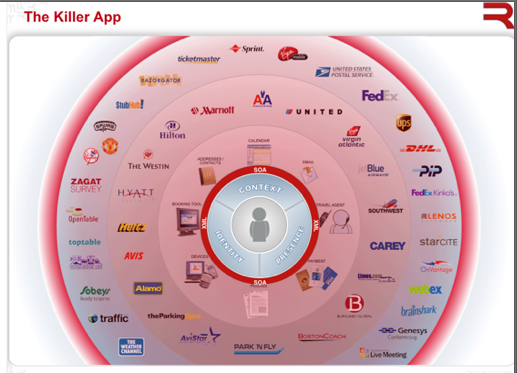
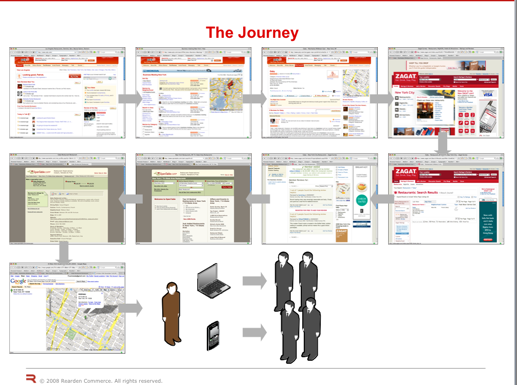
Rearden might be an enterprise play, but its software already has a consumer look an feel. Today, the difference between the two experiences is fast going away. Grady says:
If this isn’t addictive, if people don’t find this to be like an iPhone or Blackberry, then we have failed. It is only a productivity tool if you, the user, think it is better than Kayak, StubHub,or Kayak. Addiction is job one.
Grady has come along way from surviving the nuclear winter back in 2001. At the time, one investor, Jafco, tried to sell the company behind his back. Grady had to do a cram-down round and fire 45 employees to stare Jafco down and keep control of the company. Despite raising $200 million total so far, he says he has never taken a dime off the table. That’s hardcore.
